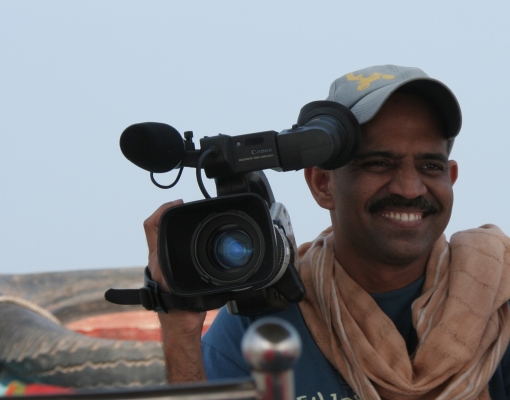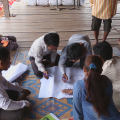Fostering transboundary cooperation using the nexus approach in the Mekong
Can the nexus approach improve Lancang-Mekong riparian countries' water, food, energy, and environmental security?
Addressing trade-offs and externalities between countries in transboundary settings, such as the Lancang-Mekong Basin, can foster trust, be a lever for regional development, and help mitigate potential conflicts. This was the key message from the recently concluded SUMERNET Research and Policy Forum held recently in Bangkok.
Dr. Louis Lebel, in his ‘setting the context’ talk highlighted that while nexus is a great way to optimize synergies, identify trade-offs across various sectors it has had limited uptake in the region. The nexus approach, despite its complexities, definitely is of interest to researchers but its influence on decisions in the region is difficult to demonstrate.
Forum participants reiterated the criticality of dialogue and communication across scales to achieve the nexus vision.
Ms. Karen Delfau highlighted why researchers and practitioner must engage on multiscale and multidimensional systems thinking networks a to leverage the benefits of the nexus approach.
Reflecting on the same challenge, Dr. Eren Zink mentioned that current systems favour short-term gains over long term systemic gains for sustainability, and human well-being; and in order to address this, it would be critical to get more actors and voices to understand and use nexus to shift the needle.
Coordination at multiple levels and among various sectors holds the key. We need water for hydropower, biodiversity, and ecosystem functioning, but we need to involve different actors for trade-offs. Ecosystems connect dimensions and levels and help make decisions. This requires more cohesion between operational, implementational, and decision-making processes. Some knowledge gaps or pockets do exist despite decades of research, but traditional knowledge can also be tapped into as an answer. Knowledge co-creation is a mechanism that provides communities with an opportunity to engage with decision makers and can support shift in the power dynamics.
Collaboration among institutional actors in the basin
The 2 key actors in the basin, the Lancang-Mekong Cooperation (LMC) and the Mekong Region Commission (MRC) need to collaborate better in different areas. The nexus approach calls for all actors, both state and non-state, to step outside their comfort zones/silos; nexus in the region still emerges as recycled Integrated Water Resources Management (IWRM) because it's not just about water, but also energy, food, ecosystems, and climate change which work on different time and space scales.
Dr Louis Lebel stated the region is still in an IWRM era, and to reach the nexus it is need to go through political processes, dialogues, negotiations, and coordination.
While there are project examples that enhanced further understanding of the interdependency between water, energy, and food security in the Lancang-Mekong, the challenges faced include lack of buy-in from state actors both in-country and at transboundary scale. Resources such as water are borderless.
Moreover, political compulsions remain the single most difficult challenge to navigate.
Participants at the forum upheld the value of fostering community stewardship for resources while continuing to build inclusive platforms that can help to build on synergies and consensually address trade-offs in managing the interconnected resources.
As highlighted by the Mekong policymaker Dr. Wijarn Simachaya, research must drive policy making in the region, wherein knowledge gaps are identified by the decision makers.
Making the nexus approach work
While linking food, ecosystems, water and energy security is easy in theory, nexus in practice faces a large array of challenges: data access and information sharing, financial constraints, gender inequality, social norms, water supply costs, fragmented capacity of key actors, innate complexity, and stratification within institutions, permeating nexus beyond water institutions, knowledge co-creation, and participation of relevant stakeholders
Forum participants recommended setting up bilateral platforms to ensure nexus dialogue, focusing on benefit sharing among multiple countries, thinking beyond water institutions, using media to inform and influence policymakers, and encouraging youth to advance the nexus agenda.
Decentralizing decision making, scaling up initiatives, providing a level playing field, and assessing community needs and addressing their issues during implementation were also mentioned. Mobilizing the agenda of energy and food security in the region requires communicating with stakeholders regarding affordable energy, strengthening national and transboundary capacity on just energy transitions, and focusing on local needs.
Media has a key role in familiarizing the nexus agenda. Collaboration between researchers and the media has the potential to significantly influence policy and regional agenda. It is vital to create a trusted platform that brings the researchers, policy makers, community leaders and media to facilitate the exchange of knowledge and information.
Regional research and policy platforms, such as SUMERNET, can therefore be instrumental to highlight challenges, foreground the importance of integrating gender, equity and social inclusion, foreground the knowledge and practices of local communities that hold some answer to nexus solutions and thus broaden the scope of engagement and practice in driving the nexus agenda in the region.
==
This piece is based on the SUMERNET Research and Policy Forum held on 10th November 2022. The forum identified gaps and opportunities in the Mekong policy frameworks and discussed how the nexus approach can be used to guide water, food, energy, and ecosystems security in the Lancang-Mekong Basin.
Info
This story is part of the following project
SUMERNET 4 All: Engaging with water insecurity in the Mekong Region
Topic
Country
Related people
You might be interested in
-
SUMERNET Vision Guide introducing the new phase "SUMERNET 4 All"
The new, revised "Vision Guide" for SUMERNET is now available. This vision guide presents an overview of SUMERNET - its origins and governance structure, background to the network, aims, key research areas, engagement with policy, and outreach products
![SUMERNET Vision Guide introducing the new phase "SUMERNET 4 All"]()
-
SUMERNET 4 All Call for Proposals on Joint Action
SUMERNET 4 All (S4A) provides financial support and technical assistance to consortia of researchers and boundary partners from the Mekong Region
![SUMERNET 4 All Call for Proposals on Joint Action]()
-
SUMERNET launches redesigned website to provide a fresh visual look and direction
SUMERNET is proud to announce the launch of our redesigned website to coincide with our new phase of work on addressing water insecurity in the Mekong Region.
![SUMERNET launches redesigned website to provide a fresh visual look and direction]()

 By
By





 Read more about SUMERNET
Read more about SUMERNET
